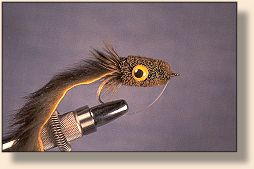Rabbit Strip Slider
By Deke Meyer
There are two basic styles of rabbit strip fly. One is the
Dahlberg Diver style, designed to dive, with the rabbit strip
wiggling in its wake. The other style is similar to a slider,
slithering along, but with a long rabbit tail. The rabbit strip
excites bass because it moves so well on the retrieve, yet also
dangles when the fly is still.
Randy Sublett of Mountain Home, Arkansas ties his Sneaky Snake
rabbit strip in dark brown with a white belly. Jack Ellis of
Woodville, Texas ties his favorite, the Grinnel Fly, in natural,
black or olive. Mark Sturtevant of Scotland, Pennsylvania ties
his Fire Tiger in a combination of fluorescent chartreuse, fluorescent
orange and black. This rabbit strip approach appeals to many creative
tiers, and I'm sure it will attract you, as well.
Tying Tips
You can vary the color scheme of this fly to suit your fancy; some good
colors include white, black, chartreuse, natural, olive, and others. You
can add Flashabou or Crystal Flash, marabou in various colors, a hackle
collar, and rubber legs.
When shopping for rabbit strips, try to get the thinnest you can find,
but are still fully covered with hair. The wider strips don't attract
any more bass, but because the hide soaks up water and becomes heavy,
the wide strip rabbit is a hindrance to cast. The advantage to thin
strips is that you still get all the bass-attracting movement, but
without bulk. That's what makes fly fishing for bass so much fun - fishing
with flies that simulate bulk to attract bass, but are actually light
and easy to cast, especially on a light rod.
Variations
The larger the deer hair head, the more buoyant the fly will be.
You can also add buoyancy with large doll eyes. If you want a fly
that floats lower in the surface film, or you want to toss your fly
on a light rod, make the deer head fairly small.
My favorite variation is to tie the rabbit strip fly with a foam
head. You can use a hard or soft foam slider head (just as you
would with a cork or foam slider), but I prefer the soft foam
EdgeWater diver head. It has more slant, causing the fly to dive
some on the retrieve. The EdgeWater diver head comes with eye holes
already drilled out, so you can install glass eyes with stems, or
lead eyes, which increase the dive rate (but also make the fly
harder to cast).
Materials: Rabbit Strip Slider
Hook: Stinger, 3/0-10.
Tail: Rabbit strip.
Hackle: Deer hair tips as a collar.
Rubber Legs: Optional, various colors, round or flat.
Body: Deer hair.
Eyes: Optional, doll eyes.
Weedguard: Optional, matches hook size.
Tying Steps:
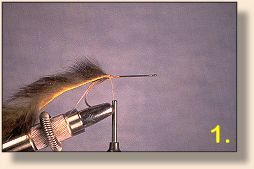
1. Debard hook, place in vise. Attach thread, tie in weedguard.
Tie in rabbit tail securely and cement (about 3 inches long, 1/8 inch wide).
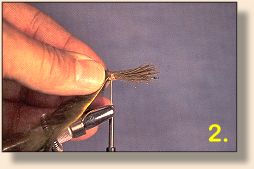
2. Clean and stack a pencil-thick bunch of deer hair. Wrap two
loose turns (while holding hair), tips to the rear.
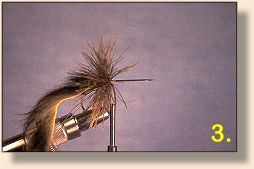
3. Release hair while pulling straight down on thread. As
hair flares around hook, wrap one right turn of thread around
hair. Stroke hair back to the rear, bring thread forward through
hair, wrap one turn around hook shank in front of hair. Push
hair back with hair pusher tool or ends of fingers. Make an
overhand or granny knot (called half hitch) with thread around
hook shank, push tight up against hair and tighten knot. (Add
second clump of hair if necessary.) Wrap thread 1/4 inch ahead
of hair.

4. Repeat Step 3 until hook shank covered, but leave room for
the weedguard and whip finished head.
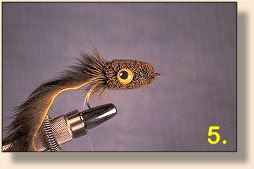
5. Remove fly from vise. Trim hair (except collar tips) to cone
shape. With scissors or wood burning tool, make indentations
in hair for doll eyes. Use silicone adhesive to attach eyes.
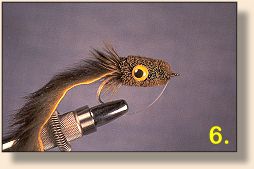
6. Install fly in vise, re-attach thread. Adjust weedguard loop,
tie down securely, clip excess monofilament. Whip finish and cement.
Fishing Tips
The Rabbit Strip Slider is meant to be fished in and around cover,
fairly slowly, to give the rabbit a chance to undulate in front of
the bass. We can speculate that the long tail mimics worms or snakes,
both of which bass eat. This design is particularly effective on
hard-fished water where bass often see poppers, in clear water where
bass can see the rabbit strip from a long ways off, and in windy
conditions where a popper is less effective.
One of my favorite tactics is the rabbit strip 'Hang Down.' I glide
the fly up alongside or in bass cover, then just let the fly sit. The
water-soaked rabbit will hang down below the surface, dangling and
slightly wiggling, looking very much alive to the hungry bass. Be sure
to mount a stout tippet - the Rabbit Strip Slider will strip bass of
any doubt - they will lance out of cover and attack your fly.
~ Deke Meyer
|

